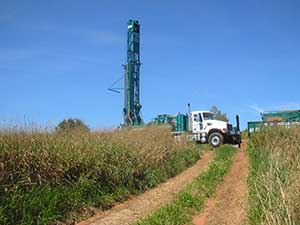
Groundwater

Groundwater is water that is found below the ground surface. It is a valuable resource that is linked to human health, ecosystem integrity and the Province's sustainable prosperity.
Groundwater in Nova Scotia
Groundwater accounts for approximately half of all domestic water sources in the province, and over 40% of Nova Scotians use private wells for their water supply.( Click here for an analysis of domestic water source and supply demographics in Nova Scotia.)
Water supply wells in Nova Scotia are commonly either shallow dug wells completed in surficial aquifers (shallow aquifers made of loose sediment such as gravel) or deeper drilled wells completed in bedrock aquifers. Nova Scotia's aquifers have been broadly divided into five bedrock and five surficial groundwater regions based on existing mapping of the dominant bedrock types and sediment deposits.
- Groundwater Regions Map and Description
- Surficial Aquifers
The Geological Survey Division's role with respect to the Province's groundwater is to produce scientific information on the quality, availability and vulnerability of groundwater in Nova Scotia and to make this information available to decision makers and the general public.
The Geological Survey Division has also contributed to the understanding of the hydrological functioning of the province’s wetland systems.
The Department of Energy and Mines works closely with Nova Scotia Environment and Climate Change (NSECC) on the assessment, management and protection of groundwater in Nova Scotia. More information on NSECC's role with respect to groundwater management can be found at http://www.novascotia.ca/nse/groundwater/.


